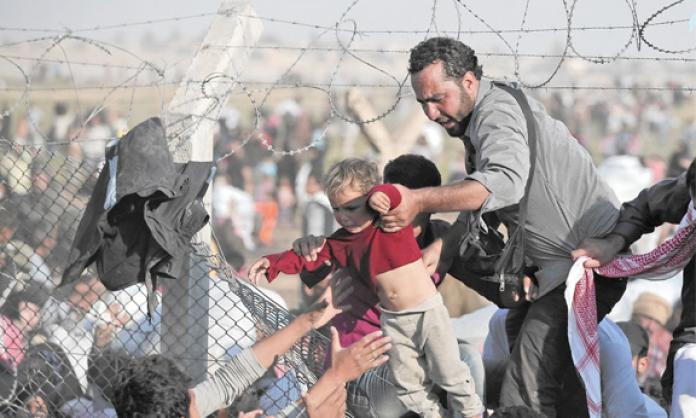The scale of the global refugee crisis is unprecedented. According to a new report by the United Nations High Commission for Refugees, 65.6 million people have been forcibly displaced from their homes.
The report, “Global Trends – Forced Displacement in 2016”, details unimaginable tragedy and devastation. Throughout 2016, 20 people were forced to leave their homes every minute. Children make up a majority of those displaced, and by even the lowest estimates there are almost 100,000 children who have fled with no other family members or guardians.
The number has grown significantly over the past two decades and is the highest in recorded history. It is almost twice the figure of 33.9 million people in 1997. In large part this is due to the Western occupations of Iraq and Afghanistan, and the savage repression of the Arab Spring. More than 20 million of those displaced and seeking refuge come from Iraq, Afghanistan and Syria.
That this crisis calls for enormous amounts of material assistance and compassion for those affected goes without saying. Yet as the crisis has worsened, the global war on refugees has been accompanied by the closing of the borders of Western nations.
“Border security” has been a relentless focus across the West since the early 2000s, but “security” doesn’t begin to describe it. Far from merely being fortified, borders have become militarised and laced with high tech surveillance operations, and all the guns are pointing at asylum seekers.
Australia has long been a trailblazer in this regard. Beginning with the imprisonment of asylum seekers in 1992, Australia’s borders are now patrolled by naval ships and aerial drones. People seeking asylum are forced at gunpoint back to the terror they’ve fled, distress calls and drowning refugees are ignored, and the Australian Federal Police has paid to have boats scuttled in Indonesia. Detention centres have become island gulags of unspeakable brutality.
These conditions are replicated across the globe. In Europe, from Denmark in the north – where refugees have their possessions requisitioned before being locked away – to the Mediterranean in the south – a graveyard of capsized asylum boats – to the jungles of Calais in France, and Viktor Orban’s fascistic Hungary, the same savage project is under way. Trump’s USA is the most bellicose incarnation of a common barbarity.
Of course, none of this is a secret. Politicians around the world pride themselves on their inhumane treatment of asylum seekers and love of borders. From Trump’s “Build the Wall”, to Tony Abbott’s “Stop the Boats”, refugee bashing has been a call to arms for the political establishment everywhere.
Coupled with this has been the systematic slandering of refugees, bordering on the pathological. Every racist trope is trotted out to smear refugees as anything from job-stealing welfare bludgers to serial rapists. Indeed, the more desperate and heart-wrenching the trauma that refugees are subjected to, the more relish the politicians seem to take in abusing them. Take Australian immigration minister Peter Dutton’s smearing of Manus Island detainees as paedophiles just days after they were shot at by Papua New Guinea Defence Force personnel earlier this year.
All of this is meant to be a big vote winner, especially among the poor and disenfranchised. Yet the politics of refugee bashing is deeply averse to the interests of working class people. Workers’ security and standards of living are being eroded by the same political establishment that grinds refugees into the dirt and sinks billions into policing the borders. That establishment seeks to use refugees and migrants as scapegoats, and neuter any resistance to a deeply unjust status quo.
Beyond this, refugee bashing has been key to ruling class attempts to configure politics in its own favour. It has enabled not only massive amounts of spending on weapons, surveillance and prisons, but has helped to undermine the politics of social solidarity and welfare, while normalising a highly authoritarian and unaccountable state. Such a state of affairs better enables governments to attack unions, welfare recipients, Indigenous people, the elderly and the disabled.
In this fashion, politicians circle like sharks around a staggering humanitarian crisis that continues to get worse. In South Sudan, a quarter of the population is now displaced. In Syria, this figure rises to almost two-thirds. Meanwhile, new conflicts continue to emerge. Their victims will face political establishments more determined to oppress and demonise them.












